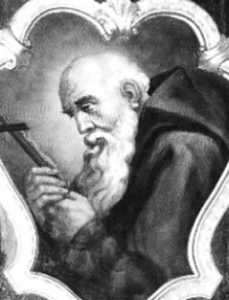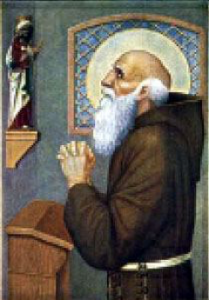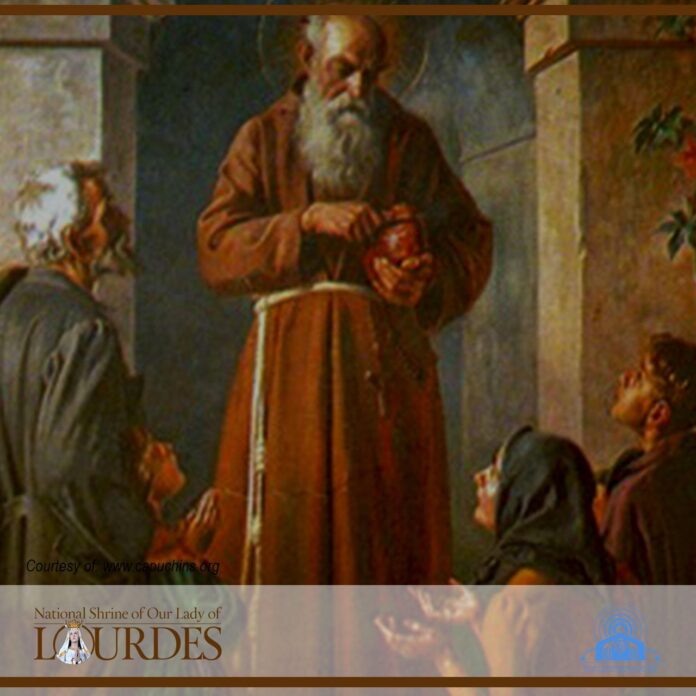SAINT KONRAD VON PARZHAM
John Birdorfer was born in Parzham, in Bavaria, in 1818. In 1842 he made his Profession as a Capuchin and took the name of Conrad. He was sent to the famous shrine of the “Mother of Mercy” at Altöttingand was in charge of the door at the Friary there until his death in 1894. He was most faithful in his duties and greatly benefited all who came to him for spiritual or material assistance. He was beatified on 15thJune 1930 and canonized on 20thMay 1934 by Pope Pius XI.
Johann Evangelist, the eleventh of twelve children to Bartholomeus Birndorfer and Gertrud Nieder-Mayerinn of Kindlbach, was born in Venushof on 22 December 1818. He attended elementary school at Weng. At the age of sixteen he was orphaned. Together with his work in the fields he focused on deepening his spiritual life within the context of popular Bavarian Catholic devotion. He loved to participate in the missions, processions, pilgrimages and was enrolled in many groups, confraternities and pious associations. He never missed Mass. He knew all the churches and sanctuaries in the surrounding area. He used to go a long way to Mass.
He was always devout. He was like a living synthesis of the various expressions of authentic Bavarian popular piety. While at work in the fields with the rake and fork, he used to raise his prayer to heaven. As the wife of a Birndorfer blacksmith observed, “The young Birndorfer was not suited to make a farmer. He had become nothing other than prayer, penance and alms.” Yet he was a hard worker. Very little however is known about his life when he was a secular and nearly nothing about his childhood. As his earliest biographer, Wolfgang Beyer, wrote, “He never spoke about himself.” He was remembered as “the little angel of Venus.” He had heaven in his eyes. His friends avoided shady conversations in his company. “Quiet now. Here comes Johann.”

At nineteen years of age he attempted unsuccessfully to study in the Benedictine school at Metten in Deggendorf. In 1841 he professed to rule of the Franciscan Third Order. When he was thirty one years old, he entered the Capuchins in Altötting as a tertiary. In 1851 he began his novitiate year in the friary at Laufen. He had the task of helping the friary gardeners. After a month he came down with a bad cold which quickly turned into acute bronchitis and he was confined to bed. It may be said that this was the beginning of an annoying congested bronchial asthma that would torment him for the rest of his life. After such a difficult traineeship he emerged a finished and complete Capuchin. One witness could say, “He was a Capuchin with all his body and soul.”
His commitment has been well documented in his eleven resolutions “made after reflection” in the novitiate before his profession:
I resolve in the first place to remain continually in the presence of God and to ask myself frequently if I would do this or that if my confessor or superior were watching me and especially if God and my guardian angel were present.
I resolve to ask myself, whenever I have to encounter crosses of suffering, “Conrad, why have you come here?”
I resolve to avoid leaving the friary, as far as possible unless it be out of love for my neighbour, obedience, reasons of health, a pious pilgrimage or some other good cause.
I resolve to foster fraternal charity in myself and in others. Therefore I resolve to take care never to say an unkind word. I resolve to bear up patiently with the defects and weaknesses of others, and as far as possible to hide them with the mantle of charity unless I am in duty bound to manifest them to someone who is in a position to correct them.
I resolve to observe silence conscientiously. I resolve to speak briefly and so avoid many pitfalls and be better able to converse with God.
When at table I resolve to place myself in the presence of God as far as I can, to remain recollected and to pass up my favourite dishes so as to practice a hidden form of mortification. I resolve not to eat between meals unless ordered to do so under obedience.
I resolve to answer the first call of the bell unless legitimately hindered.
I resolve to avoid, as far as possible, conversing with the opposite sex unless obedience imposes duties on me which make it necessary to speak with women. In that case I resolve to be very reserved and maintain custody of the eyes.
I resolve to carry out orders punctually and to the letter. I resolve especially to make every effort to conquer my own will in all things.
I resolve to force myself to pay close attention to minor details and as far as possible avoid every imperfection. I resolve to observe the holy rule faithfully and not to depart from it a hairsbreadth, come what may.
I resolve to cultivate a deep devotion to the Blessed Virgin Mary and strive to imitate her virtues.
These were inspired by the great good sense of a solid and concrete man, a living portrait of the Capuchin spirit that Br. Konrad desired and assimilated. The resolutions are about the presence of God, silence, the meaning of the crosses one meets, withdrawn recollection, fraternal love, mortification of stomach and the eyes, promptness to the choir, gentleness and discretion with women, obedience and inner devotion to the Virgin. These make up a striking wish-list, a refrain of holiness that recalls the desire for faith, obedience and service the Poverello of Assisi observed retrospectively in his Testament. These are simple resolutions that enable to read correctly many facts in the life of Br. Konrad von Parzham. After his religious profession on 4 October 1852 he was sent back to Altötting to serve as porter in the friary of Saint Anna (now called Saint Konrad’s). He was to remain there until his death on 21 April 1894.
As porter for forty years next to the celebrated Marian shrine, the destination of numerous pilgrimages, he became the point of reference for people of every kind, especially the poor, the dispossessed, the troubled and children. At the sound of the door bell he would hurry, open the door, smile and embrace their misfortunes. He gave unstintingly and did not pass judgment. Economic laws were unknown to him. The reason he gave was because the people were poor. He waited for the requests of the poor like a beggar for alms. No one ever saw him sad or irritable, but was always ready at any hour, in all seasons. Called the “holy porter” his holiness stemmed from his heroic fidelity and strong Eucharistic and Marian devotion and wrapped in prayerful silence and constant charity. Because of this, and because of his timid and reserved character, he spoke very little. His phrases were short but full of spirit which often provoked compunction and converted hearts. His customary expression was, “In Gottes Namen” or “Wie der liebe Gott es will” ( “In the name of God” and “As the good God wills.”) Konrad’s phrases could make up a bouquet of sayings.
Such was his way of preaching, advising and comforting – applying to himself the words of the Rule of Saint Francis: “with brevity of speech.” His silence, however, was clearer than his words. Prayer was his treasure and silence was its secret, as he wrote in a letter on 3 October 1873: “We should try very much to live a life entirely intimate and hidden in God, since it is such a beautiful thing to stay with the good God. If we are truly recollected nothing will be an obstacle to us, even in the midst of the concerns that our vocation brings. We will love silence so much because a soul that speaks a lot will never achieve a truly interior life.” He had already become methodical and well-ordered like a clock. His activities were as regular as clockwork too. Always the first to the midnight prayer he also always secured for himself the privilege to serve the first Mass in the Gnadenkapelle and to receive Holy Communion every day.
He was always on the move. His face was transfigured when he emerged from the little closet under the staircase of Saint Alexis where he usually went for his secret prayer. This was a tiny room where he could peek through to the altar of the church and see the tabernacle. Usually he was radiant when the moment came to distribute food to the poor. He would take himself to the kitchen and when the brother cook observed Br. Konrad’s ladle visit all the pots, he used to complain jokingly, “Put the lids on. Otherwise he will take everything.” He would smile and answer, “Everything given to the poor returns again abundantly.” This was in the best Capuchin tradition that mirrored the shining example of the Poverello.
He loved to read the Imitation of Christ by Thomas a Kempis, or some other devout book, like the meditations on the passion of Christ by his confrere Martin von Cochem or the Mirror of the Virtues by Augustin Ilg. He was accustomed to say, “The Cross is my only book. One look at the Cross teaches me how I should conduct myself for every occasion.” His essential and lucid spirituality is completely contained in these autobiographical words: “My tenor of life consists above all in loving and suffering in contemplation, and to adore and contemplate and admire that nameless love for us poor creatures. I never reach the end of this love of my God because nothing gets in my way. In this way I am always intimately united with my love. In the many daily concerns I am often more intimately united with him than I can say. With all the confidence that a toddler has with its father I make known to Him my needs, my prayers, what presses me most … I am always happy and content in God. I receive everything with gratitude from my dear heavenly Father, whether pain or joy. He knows very well what is best for us. And so I am always happy in God. I try to love him very much. Ah! Very often this is my one worry, that I love Him so little. Yes, I would truly rather be a seraph of love. I would invite all creatures to help me to love my God.”
Konrad was short in stature and in his last years he became very stooped, and his head almost completely bald, except for his flowing, white beard and a crown of hair on the nape of his neck. So he is presented in the iconography with a cross in his hand or in the act of distributing charity to the poor. He is the second German saint after the protestant reformation – the first was Saint Fidelis von Sigmaringen.
The cause of his canonisation was extraordinarily quick, given too that because of the War all the collected documentation could only be sent to Rome at the end of 1919. In 1924 Pius XI supported the process of the “holy porter” and proclaimed him blessed in 1930. On 20 May 1934 he enrolled him in the list of saints. Such a rapid and straight path of the cause could easy have appeared to be for political reasons. It was, however, as the Pope said, “the divine art of Our Lord in preparing, arranging and organising things to have facts, events and encounters coordinate happily.” However the miracle of the humble figure of the holy brother of Parzham stands. An upright life without dramas, simple, without problems, almost without a background, like a wild flower in the reach of all. He is an imitable, clear and very easy model – without special highlights. He is a good Bavarian farmer, but without the gaudy colour of Bavaria and without the complicated joy of baroque religiosity. He is different from his national Catholicism. There is no reference to homeland or nationalism in him. His is a message of simplicity within the “terrible day-to-day” that takes on ever deeper and intimate meaning and which requires attentive listening and a perceptive, penetrating gaze.
His feast day is celebrated on 21 April. He is co-patron of the Capuchin Province of Bavaria and of Hungary. He is patron of Capuchin Province of Mid-America; the diocese of Passau, Germany; of the Opera Serafica di Carità and of the Catholic youth of Würzburg.
Translation based on Costanzo Cargnoni, Sulle orme dei santi, Rome, 2000, p.29-36

From a letter of Saint Conrad of Parzham
I am always united with the most high God, my beloved.
God willed that I should renounce everything that I held dear and comfortable, and I give him thanks for calling me to religious life where I have found more peace and happiness than was ever mine in the world. My way of life is wholly this: to love and to suffer, always contemplating, adoring, alive to the ineffable love that God bears towards the least of his creatures. There is no journey’s end in such love of God.
Nothing at all stands in the way and I remain always united with the most high God, my beloved; indeed, the busier I am the more united to God I feel. I talk with God, easily, like a son With his father, pouring out my prayers and desires, and with complete filial trust making known to him all that weighs upon me. Should I fall into sin, I very humbly beg his forgiveness, asking only that I may be the good docile child of a very loving Father, and show him an ever greater love.
My book is the crucifix. I have only to raise my eyes to that to learn gentleness and humility. A single glance at Jesus on the Cross and I know how I ought to behave in all circumstances of life. I learn gentleness, humility and patience and how to bear my cross; it even becomes easy and light. I receive all my joys and sorrows with thanksgiving from a heavenly Father; he knows best what is good for us.
So I am always rejoicing in the Lord, my only complaint is that I do not love him enough. If only I were one of the Seraphim in my love; I would want to compel every single creature to help me to love.
P r a y e r
Most kind Father, you used Saint Conrad
to open the door of your mercy to many of the faithful.
Give to us now some of his spirit of poverty a n d humility of heart,
so that we also may be ready to serve those in need.
We ask this through our Lord Jesus Christ, your Son,
who lives and reigns with you and the Holy Spirit,
God, for ever and ever. Amen.
Published with permission from www.capdox.capuchin.org.au


